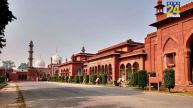New Delhi: Prime Minister Narendra Modi Tuesday paid tributes to Gurudev Rabindranath Tagore on his Jayanti.
In a tweet, the Prime Minister said, “On the occasion of his Jayanti, my tributes to Gurudev Tagore. From art to music and from education to literature, he has left an indelible mark across several areas. We reiterate our commitment to fulfilling his vision for a prosperous, progressive and enlightened India.”
On the occasion of his Jayanti, my tributes to Gurudev Tagore. From art to music and from education to literature, he has left an indelible mark across several areas. We reiterate our commitment to fulfilling his vision for a prosperous, progressive and enlightened India.
— Narendra Modi (@narendramodi) May 9, 2023
---Advertisement---
Rabindranath Tagore was a notable Bengali poet, writer, painter, composer, and philosopher. His birth anniversary is commemorated on Jayanti, sometimes referred to as Rabindra Jayanti.
He began composing poems when he was just 8 years old, and by the time he was 16, he had moved to short stories and plays. In addition to this, Rabindranath was a social reformer who actively participated in the campaign for Indian independence from British control.
Additionally, Visva-Bharati University, a central research university and an Institution of National Importance located in Shantiniketan, West Bengal, was founded with Rabindranath Tagore’s permission.
He received the Nobel Prize in Literature in 1931, making history as the first non-European and the first lyricist to do so. Sometimes, Rabindranath Tagore is referred to as “the Bard of Bengali”.
History & Achievements of Rabindranath Tagore
On May 7, 1861, in Calcutta (now Kolkata), West Bengal, Robindronath Thakur was given the name Rabindranath Tagore. Rabindranath was the youngest of the family’s 13 living children.
His parents were Sarada Devi and Debendranath Tagore, both religious reformers. He was primarily nurtured by the household staff because his mother passed away while he was very small and his father used to take frequent trips.
Rabindranath began writing verse and poetry at a young age, but his father wanted him to study law, so he moved to England. To pursue independent study of Shakespeare’s plays such as Coriolanus, Antony & Cleopatra, etc., he quit law school there.
He finished writing his poetry collection Manasi and published other collections of poetry after returning to India. Gitanjali, a collection of poems by Rabindranath Tagore, helped him win the Nobel Prize for Literature, becoming him the first non-European to ever do so. The UNESCO Collection of Representative Works includes Gitanjali as well.













